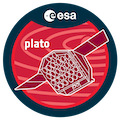Speaker
Description
Ultra short period (USP) planets have orbital periods of less than one day. While their origins are unknown, it was proposed that these peculiar planets could have been formed further out in the protoplanetary disk and migrated inwards through some dynamical interactions to short orbital distances from the star. We present the discovery of a USP (P=0.38d) super-Earth planet transiting a M dwarf star TOI-2290. Observations revealed the planet has a mass of 2.75 +/- 0.52 M_earth, a radius of 1.29 +/- 0.08 R_earth, and a high bulk density of 7.04 +/- 1.87 g/cm^3. TOI-2290b is consistent with an interior composition made up of at least 50% iron core. Unlike many systems hosting a USP planet, TOI-2290b appears to be the only planet orbiting the host star. Hence, there remains a possibility of finding an outer companion or a requirement for an alternative formation pathway to explain the origin of the single transiting planet TOI-2290b. PLATO will revisit a number of USP planet systems as well as discover a large number of small, transiting planets that include many USPs. The new data will provide us a more comprehensive insight on architectures of USP systems and allow for better constraints on formation and evolution theories of such systems.

